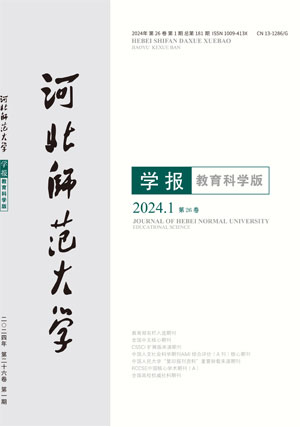期刊信息

- 刊名: 河北师范大学学报(教育科学版)Journal of Hebei Normal University (Educational Science Edition)
- 主办: 河北师范大学
- ISSN: 1009-413X
- CN: 13-1286/G
- 教育部名栏入选期刊
- 全国中文核心期刊
- CSSCI扩展版来源期刊
- AMI综合评价(A刊)核心期刊
- RCCSE中国核心学术期刊
- 全国高校特色栏目社科学报
- 中国人民大学“复印报刊资料”重要转载来源期刊
- 全国高校权威社科期刊
清代教师惩戒权的文化内涵与制度特征
-
作者单位:(北京师范大学 教育学部,北京 100875) -
起止页码:22 - 27页 -
DOI:10.13763/j.cnki.jhebnu.ese.2023.05.004
Teachers’ Disciplinary Power in Qing Dynasty: Cultural Connotation and Institutional Characteristics
摘要/Abstract
清代教师惩戒权在继承历代制度的基础上得以完善,适用范围广、可操作性强,且具有相关保障机制。清代教师惩戒规则是一种“儒法并存”的教化设计,将“克己复礼”的儒家伦理教化思想与法家法制、刑罚治理思想相结合,将教师惩戒权列于“天地君亲师” 的精神信仰序列之中。同时,传统因果报应思想也为教师惩戒权提供了一定的正当性。此三者构成了清代教师惩戒权的独特内涵,并彰显了“儒表法里”“鼓励自新”“政教合一”“师道尊严”等鲜明的特征。
Inheriting the systems of previous dynasties,the disciplinary power of teachers was enhanced in the Qing Dynasty (1644 AD-1912 AD) with wide scope of application,good operability and related guarantee mechanism.Teachers’ disciplinary rules in the Qing Dynasty were moral education design incorporating Confucianism and Legalism.They combined the Confucian thought on ethical education,which encourages “restraining oneself and restoring the rites,” with the Legalists’ thought on the rule of law and the governance by criminal penalty.Teachers’ disciplinary power was listed in the sequence of spiritual beliefs in the “Heaven,earth,monarch,parents,and teachers.” Meanwhile,the traditional karma thought also provided some legitimacy for teachers’ disciplinary power.These three factors constitute the unique connotation of teachers’ disciplinary power in the Qing Dynasty,and highlight the distinct characteristics of “Confucianism on the outside and Legalism on the inside,” “encouraging self-renewal,”“the integration of the power of secular government with the religious power,”and “the absolute authority of the teachers” and so on.
关键词
参考文献 19
- [ 1 ] 田振洪. 清代学校教育惩戒制度论析[J]. 教育史研究,2022,4(3):78-87.
- [ 2 ] 田振洪. 传统中国教育惩戒规则的历史考察与启示——以官学学规为主要视角[J].法学教育研究,2020,31(4):397-414.
- [ 3 ] 陈刚,廖其发. 我国古代教育惩戒及其启示[J]. 重庆社会科学,2006(7):120-124.
- [ 4 ] 余家福,刘玉婷.“儒表法里”之下中国古代教育惩戒的实践性探究[J].中国德育,2021(5):31-34.
- [ 5 ] 素尔讷等纂修,霍有明,郭海文校注.钦定学政全书校注[M]. 武汉:武汉大学出版社, 2009.
- [ 6 ] 刘锦藻编纂. 清朝续文献通考[M].北京:商务印书馆,1955.
- [ 7 ] 周凯.内自讼斋杂刻(第3册)[M].周氏家刊本, 1825.
- [ 8 ] 杨伯峻译注.论语译注[M].北京:中华书局, 2012.
- [ 9 ] 阎步克.士大夫政治演生史稿[M]. 北京:北京大学出版社, 2015.
- [ 10 ] 安小兰译注. 荀子[M].北京:中华书局, 2007.
- [ 11 ] 程颢,程颐.二程集[M].北京:中华书局, 1981.
- [ 12 ] 王有英.清前期社会教化研究[M].上海:上海人民出版社, 2009.
- [ 13 ] 清世宗实录(卷6)[M].内府朱格写本, 1741.
- [ 14 ] 徐梓.“天地君亲师”源流考[J].北京师范大学学报(社会科学版),2006(2):99-106.
- [ 15 ] 大正新修大藏经(卷24)[M].台北:新文丰出版公司, 1983.
- [ 16 ] 金敞.宗约[A].楼含松.中国历代家训集成(第6册)[C].杭州:浙江古籍出版社, 2017.
- [ 17 ] 冯友兰.中国哲学史新编(上卷)[M].北京:商务印书馆, 2020.
- [ 18 ] 刘显世,谷正伦修,任可澄,杨恩元纂.贵州通志(第3册)[M].贵阳:贵阳书局,1948.
- [ 19 ] 王晫,张潮辑.檀几丛书·余集[M].上海:上海古籍出版社,1992.
